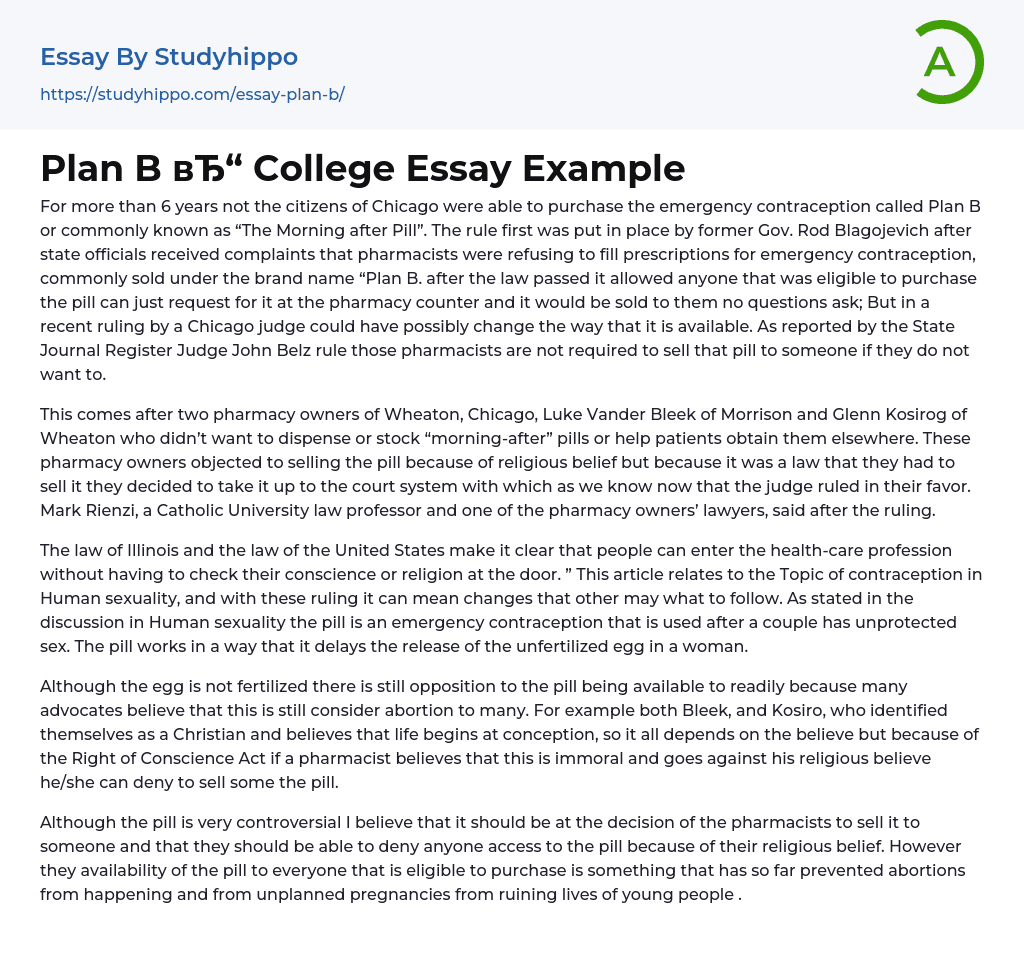For over 6 years, the citizens of Chicago faced a ban on purchasing Plan B, also known as the "Morning after Pill". The former Governor, Rod Blagojevich, implemented this restriction due to complaints about pharmacists refusing to fill prescriptions for emergency contraception. Despite these concerns, eligible individuals could obtain the pill without any hassle by simply requesting it at the pharmacy counter. However, a recent ruling by Judge John Belz in Chicago has potentially altered its availability. As reported by the State Journal Register, Judge Belz declared that pharmacists have no obligation to sell the pill if they opt not to do so.
Two pharmacy owners in Wheaton, Chicago, Luke Vander Bleek of Morrison and Glenn Kosirog of Wheaton, expressed their objection to dispensing or stocking "morning-after" pills or assisting patients in obtaining them elsewhere. The pharmacy owners refused to sell the
...pill due to religious beliefs. However, since it was mandated by law, they decided to challenge the matter in court. The judge ultimately ruled in their favor. Mark Rienzi, a lawyer representing the pharmacy owners and a professor of law at Catholic University, expressed his satisfaction with the ruling.
The law in Illinois and the United States explicitly states that individuals can pursue a career in the healthcare profession without sacrificing their personal conscience or religious beliefs. This article pertains to the topic of contraception in human sexuality and the aforementioned regulations could potentially influence future changes. A relevant discussion in human sexuality emphasizes that the pill acts as an emergency contraception method, utilized following unprotected sexual intercourse. Its mechanism involves postponing the release of an unfertilized egg in females.
There is a debate on th
availability of the pill while the egg is not fertilized. Some advocates argue that it can still be considered abortion. This viewpoint is represented by Bleek and Kosiro, both Christians who believe life begins at conception. Therefore, opinions vary depending on personal beliefs. Additionally, under the Right of Conscience Act, pharmacists have the right to decline selling the pill if they view it as immoral and conflicting with their religious convictions.
Although there is controversy surrounding the pill, I support pharmacists having the choice to sell it and also being able to refuse access based on religious beliefs. Nonetheless, making sure it is available to all eligible buyers has led to decreased abortion rates and protected young individuals from the negative consequences of unintended pregnancies.
- Professor essays
- Should College be Free essays
- Should college athletes be paid essays
- College Education essays
- College Tuition essays
- Graduation essays
- College Goals essays
- Personal Statement essays
- Online Classes Vs Traditional Classes essays
- Online Education essays
- Student Loan essays
- Study Abroad Scholarship essays
- Reasons To Go To College essays
- Paying College Athletes essays
- Technology In The Classroom essays
- Hospital essays
- Physician essays
- Health Care Provider essays
- Universal Health Care essays
- Readmission essays
- Birth Control essays
- Drug Addiction essays
- Eating Disorders essays
- Epidemiology essays
- Hiv essays
- Hygiene essays
- Obesity essays
- Social Care essays
- Teenage Pregnancy essays
- Classroom essays
- College essays
- E-Learning essays
- Elementary School essays
- Examination essays
- Graduate School essays
- High School essays
- History Of Education essays
- Homeschooling essays
- Kindergarten essays
- Middle School essays
- Public School essays
- School essays
- Single Sex Schools essays
- Special Education essays
- Student essays
- Teacher essays
- University essays
- Vocational Education essays
- Addiction essays
- Anatomy and Physiology essays




